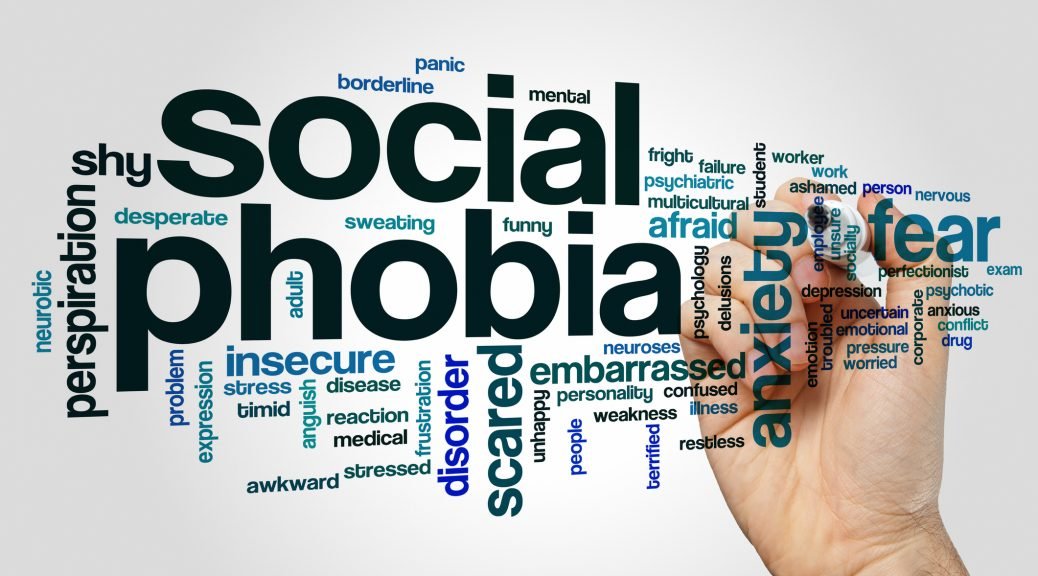Social Anxiety Disorder Symptoms:
Social Anxiety Disorder, previously referred to as social phobia is one of the more common anxiety disorders. It is usually experienced when you must perform in front of others or feel like you are being scrutinized by other people. The overall feeling is one of fear of possible embarrassment or humiliation. While many people find some way to endure the high level of anxiety they experience, others may avoid these feared experiences altogether. Usually you fear that you are going to be judged by others as being nervous, weak or stupid when you say or do something. In most cases people believe that their anxiety is excessive, and their fear is way out of proportion to the situation. Children however, do not recognize that their fear is excessive.
Studies have found that the most common social anxiety disorder or phobia is the fear of public speaking. It is believed to affect 3 out of 4 people or 75% of the population. It also accounts for approximately 19% and is easily the largest majority of those suffering from some form of phobia. This anxiety speech disorder is known to commonly affect speakers, people whose jobs require them to make public presentations, and even students speaking before the class. This form of social anxiety disorder is just as prevalent among men as among women. Overall, the most common social anxiety disorders include the following:
• fear of signing documents and writing in public
• fear of crowds
• fear of using restrooms in public
• fear of eating, spilling food or choking in public
• fear of being watched by others at work
• fear of taking examinations
Social Anxiety Disorder Diagnosis:
Social Anxiety Disorder is often distinguished by whether it is generalized or specific. The DSM-V has a performance only specifier which is given if you only experience this severe level of anxiety performing such as when public speaking. In these cases you may not feel otherwise impaired in your occupational, social or academic situations where public speaking is a requirement. You may not be afraid or avoid other social experiences. Also, if you experience panic attacks in conjunction with Social Anxiety Disorder, the specifier with panic attacks should be added to the diagnosis. If you experience anxiety in a more generalized sense in any social group situation where you fear being watched or evaluated, you may be experiencing a more generalized form of Social Anxiety Disorder. In most cases, the actual Social Anxiety Disorder diagnosis will not be given unless it interferes with your work, social activities or important personal relationships in very significant ways, usually causing a high level of personal distress. Like agoraphobia, Social Anxiety Disorder may be accompanied by panic that is related to the feelings of being embarrassed or humiliated, when trapped in a circumstance that provokes a high level of anxiety and distress. In these situations, the anxiety would rise only in circumstances related to the specific type of social situation feared.
Social Anxiety Disorder treatment:
There are several treatments that have been used to cope with Social Anxiety Disorder. One of the common sense recommendations by lay persons and some clinicians is to “take a deep breath”. Deep breathing from the abdomen and relaxation techniques can be practiced on a regular basis to relieve the physical symptoms of anxiety.
Social Anxiety Disorder Psychological Treatments:
Cognitive Behavior Therapy:
Cognitive Behavior Therapy has been effectively used for Social Anxiety Disorder. With this type of therapy, fearful thoughts are identified, challenged and often replaced by more realistic and adaptive thoughts. For example, a thought such as “I am going to be so nervous that I make a fool of myself” may be replaced by a thought such as “I will be nervous at first, but most people will not be bothered by that”.
Exposure Techniques for Social Anxiety Disorder:
One of the more effective long-term treatments for Social Anxiety Disorder is the use of exposure. Exposure can be imaginal or real-life exposure to the actual circumstances that are feared. The exposure is usually gradual or incremental in facing circumstances you are phobic or fearful of. If you experience an extremely high level of social anxiety about public speaking, you may give a very short talk to one or several friends, and then gradually increase it to a longer period of time with more observers. You would incrementally build up both the length of time and individuals observing to reduce the level of anxiety over a period of time.
While treatment for Social Anxiety Disorder is often done on a one-on-one basis, many mental health clinicians recommend group therapy as the ideal treatment format. This seems to more directly reflect the stimuli that would provoke the actual phobic reaction or Social Anxiety Disorder.
Social Skills and Assertiveness Training:
Sometimes learning basic social skills and learning to assert oneself can be very helpful in overcoming social phobias and Social Anxiety Disorder. Learning to smile, make eye contact, and maintaining conversations can be very helpful to developing a sense of mastery and coping with social situations, reducing the underlying level of anxiety. Also, learning to assert oneself can also be very helpful in learning how to tell others what you want or don’t want, without feeling like you must just go along with others demands.
Medications for Social Anxiety Disorder:
Medications are often given for Social Anxiety Disorder. The most common medications are the antidepressants, SSRI medications such as Paxil, Zoloft, Luvox and Serzone, and anxiety medications such as the benzodiazepines, which include Xanax or Klonopin. These medications are usually used as an adjunct to the cognitive behavior and exposure-based therapies mentioned above. Occasionally, MAO inhibitors such as Nardil and Parnate have been recommended to treat social phobias or social anxiety disorders.
Summary of Social Anxiety Disorder:
Many people suffer from Social Anxiety Disorder sometimes referred to as social phobia. The actual diagnosed disorder was changed in the new DSM-V which is used to diagnose mental health disorders by clinicians. You don’t have to suffer from Social Anxiety Disorder forever as both medications and psychological treatments are now available to relieve suffering.
Some information adapted by Paul Susic Ph.D. Licensed Psychologist from The Anxiety and Phobia Workbook by Edmund J. Bourne Ph.D.



